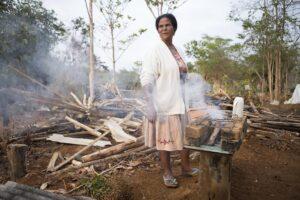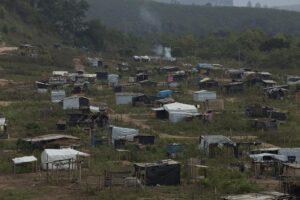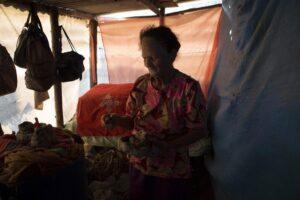Between Hope and a New Horizon
All along the Doce River, through the states of Minas Gerais and Espirito Santo, people and the environment were affected by the dam that broke on November 5, 2015. The disaster was a result of neglect on the part of the dam’s owners – the Samarco mining company and its parent companies Vale and BHP Billiton. Fifty million cubic meters of toxic mud flowed into the Doce River and then to the Atlantic Ocean. This crime was the biggest environmental disaster in Brazil’s history, with serious economic, political, social and environmental consequences. The water in the region was immediately unusable. There was and still is a major loss of income for those who depended on fishing and agriculture throughout the region.
The Landless Workers Movement (MST) has had an active presence in the Governador Valadares region and in other areas along the Doce River. They began organizing people who had been affected by the dam disaster, people who had suffered the consequences including job loss and lack of clean water. These families needed agriculturally productive and safe land to inhabit.
The story of Érica’s resistance is one example of strength of the woman in this struggle.
In September of 2016, almost a year after the dam broke, Érica M. was among the 350 families that established the Esperança (meaning hope) encampment on the inactive land of the company Cenibra (Celulose Nipo Brasileira, a paper company).

Érica was one of the first to step on to the land, and soon became one of the main leaders of the encampment. She is well aware of the difficulties experienced by the landless people, having left her own town and her regular routine to join the encampment. Erica didn’t always think highly of the MST – she laughs when she remembers how much she judged the movement when they would march on the capital, when she did not understand how the MST worked. But today she feels the importance of the movement pulsating through her, seeking equality and opportunities for people. She is well aware of the difficulties people have experienced, seeing the costs of bills go up (especially drinking water) in Governador Valadares, at the same time unemployment is on the rise. She also knows well what defenders of people and land are going up against: Erica’s fellow MST organizer, Silvino Nunes Gouveia, was assassinated by the militias of Periquito because of his outspokenness. In this struggle for land, she and the other community leaders do not stop fighting. Even through the moments of terror and tension, Érica preservers through the fight.
Indeed, on Sunday in May 2017, Mother’s Day, the occupants of the Esperança encampment were evicted. In exchange for a peaceful eviction from the land, the state promised resettlement on another area of land in the Eldorado region. But the authorities did not fulfill their promise. The government gave the land back to Cenibra without providing the occupants new land to move to.
 After the eviction the families were offered a temporary space at a nearby MST settlement named Liberdade, the former home of Gouveia. Even in the face of these challenges – with a lack of resources and stability – members of the Esperança encampment worked hard to rebuild their homes and stay true to their identities.
After the eviction the families were offered a temporary space at a nearby MST settlement named Liberdade, the former home of Gouveia. Even in the face of these challenges – with a lack of resources and stability – members of the Esperança encampment worked hard to rebuild their homes and stay true to their identities.
However, the struggle continues and it is intertwined with the struggle of other communities. Responding to a call for support from another encampment – the Novo Horizonte (meaning New Horizon) encampment, established by the Federation of Agricultural Workers of Minas Gerais, which had recently suffered an eviction – the members of the Esperança encampment joined with the Novo Horizonte encampment to organize another encampment.
Érica, on her birthday, helped lead the establishment a new encampment for the two groups. Occupation, resistance and agricultural production are the guiding concepts for the MST. With concentration and organization they created openings in fences so that the people could enter the property to start setting up their new homes – tents for the time being, until they win title to the land (which usually takes years) – and make the land productive by growing healthy food. In the early morning of October 2nd, the new encampment was established.

Maria, a fearless septuagenarian who had been part of the Esperança encampment since before the eviction, was ready to fight for her rights and be an example to others. « We have to fight. I’ll fight until I get my land. » She was one of the first to step out onto the land at 4a.m. that morning. Right away she started organizing her tent – her new home for now. “I already told you, I’m not going to give up.”
Érica received a different kind of present for her birthday: the smile of the people she saw there and the possibility for a new start.
Based on an article by Nilmar Lage, Brasil de Fato. Photos courtesy of Brasil de Fato
